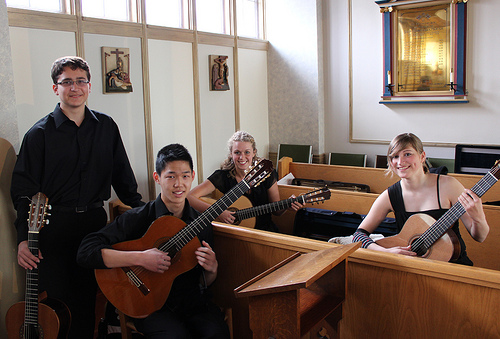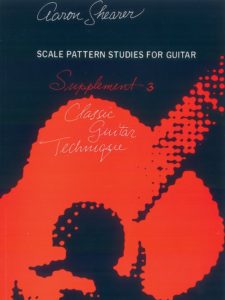I’ve been pondering student retention in music lessons and here are some thoughts on the subject.
Success & progress is the key
The idea of keeping the student happy is a misconception. As a teacher you need to focus on your job, that of making the student a good musician. You can only keep a student happy for so long if they are not progressing. If they don’t improve you’re facing an uphill battle. So, don’t be too soft on the students. They will not quit after the first few lessons (see the ‘term’ section below) so aim to have the student succeed at the material both within the lesson but also a few lessons down the road.
If a student is good at something they will enjoy it. If they constantly struggle they will despise it. Therefore, set small goals and make sure they succeed. If you have to tell them to correct something one hundred times during a lesson then do it. You can make a joke about saying it so many times but be firm about the intention. Be a good teacher first and a friend second.
It doesn’t matter if the progress is a big leap or an incredibly small step forward, you want to be able to tell the student, truthfully, that they have accomplished such-and-such goal.
The term versus the individual lesson
Having the student sign up for a term of lessons rather than paying by the individual lesson is very important. When they sign up for a term they are committing to the long-run and it gives teachers time to allow the student to understand their teaching plan. Once they are signed up for a term you can be a bit harder on them at the beginning of the term and slowly ease off the pressure as the term progresses. This will make them better musicians at the end of the term and because you eased off they will feel that lessons are only getting better and better.
The half & half lesson plan
One thing I have found very successful, especially with teen students, is to control the first half of the lesson while leaving the last half more open to the wants and needs of the student. This ensures that the proper material I consider essential is always covered. From the student perspective, they know the second half of the lessons (the ‘fun’ part) is coming and it also ends the lesson with a positive vibe. As the student progresses and gets ‘hooked’ on music I may alter the arrangement so that more of the lesson is my educational material.
I think this is also important because teachers should not hinder the development of the student’s unique and individualistic style and interests. Let them play different styles during ‘their’ time, let them explore their own artistic scope. More importantly, let the lesson be ‘their’ thing, not the forced activity enforced by you or their parents (for kids).
Clear accomplished goals
Make sure the student understands clear and small goals to accomplish every week. Music can be practiced endlessly but you want the student to know they have improved or succeeded. Make sure to write it down and check the following week, they need to be aware of what to work on. If they accomplish even one small goal they will feel good about the lesson. So, don’t try to fix everything about their playing right off the bat, allow them to feel positive about the progress they are making.
The consistent practice routine
The consistency and routine aspect of practicing is also part of long-term success and student retention. Just as brushing one’s teeth or sitting down to dinner is part of everyday life, so is practicing. Students who block off that daily time and just do it, no questions or distractions, have an easier time in music. For these students there is no stress about practicing or worrying about the next lesson, it’s just consistent progress by small amounts.
For my youth students, the best time is just before dinner. Their parents are around to prepare the meal and it’s a good time for the student to practice. They should get a small snack beforehand and then get to work all the way until dinner is ready. It’s perfect if the parent can hear the student from the other room both to enjoy the sound but also to keep an eye on study habits.
A healthy experience (physically & mentally)
If the student’s musical experience is not healthy they will eventually quit or collapse either physically or mentally. Playing needs to feel relaxing and comfortable and the concentration of practicing needs to also feel healthy. Make sure they sit properly and they play their instrument in an ergonomic fashion. Also, make sure they practice with very small goals so that during each practice session they improve and feel good about their progress.
New experiences for long-term students
Long-term students need new experiences to keep that positive forward movement happening. Joining an ensemble is the best way for this but performance is also a path. Performances keep the student focused on goals and also works as a graduation ceremony of sorts. Since, in music, one can work on a piece literally forever, there needs to be a point where the piece can be completed. Performing is the way to that goal. For resolute non-performers I like to do end-of-term audio recordings or videos using something like the Zoom Q4 Handy HD Video Recorder. Or, at minimum, a performance in the studio that feels different from the usual lesson. Festivals and competitions are also great experiences that make students feel connected to something bigger. The friendships they form at festival can sometimes last a lifetime.
Make it social & encourage social connections
To end this conversation I will make one final comment and highly encourage this aspect as one of the most important:
Students who make social connections will study for longer periods and progress further than student who do not.
The students of mine who have joined ensembles, taken part in recitals, enjoyed a music summer camp, or simply come to social events are better musicians and study for longer periods. Don’t expect someone to go to a practice room alone every day and keep with it for years. Additionally, the increased flow of ideas for musical social interaction will jump-start their creativity and inspiration.
So, organize recitals, start up ensembles, plan social events and get your students connected to the musical community.
What are your thoughts about student retention?





